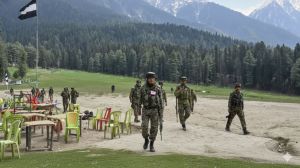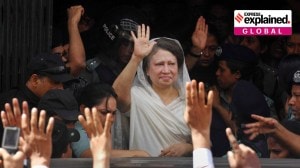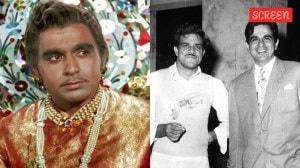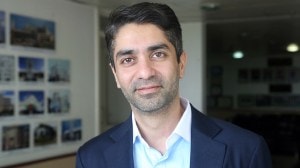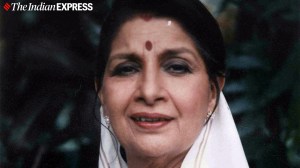Ebong badal
Sudeb Sinha spent the last two years making a documentary film on Badal Sircar. He remembers a man of great charm and humour,and a childs passion for collages
When i walked into Badal Sircars room in December 2008,I was nervous. I looked around and what attracted my attention was the paper collage that was pasted on the wall opposite me. I was to learn later that Badalda harboured a child-like passion for collages. There were books strewn all over,but the room could not really be called untidy,there was a sense of order in the chaos. Then I spoke to the man I have admired for most of my life theatre veteran Badal Sircar,whose play Ebong Indrajit had changed my life when I read it as a teenager. The man who had the vision to take theatre beyond the limiting confines of auditoriums and use it as a tool to connect with the common man.
I told him that I wanted to make a documentary on him,but he was indifferent. Ei shob kore kichu hobe na Nothing will come out of this, he said. A rejection from an idol should have been enough to crush my hopes,but there was something about the man that didnt let my hopes die.
His house,for one,was open to everyone who had a serious interest in theatre. In the two years that I have known him closely,I have seen youngsters,professors and aspiring actors visiting him for advice or even a healthy session of adda. I asked him if I could visit him,now and then,and he said yes.
With every visit,our comfort level increased. And slowly,I realised that Badalda had an amazing ability to make people comfortable without making any obvious gestures. He would casually offer you a plate of crispies and,before you knew it,you were sharing a bottle of beer with him. His damaged lung compelled him to restrict his cigarette intake,but he would not give up. He would light a cigarette,take a few puffs and then use a blade to saw off the embers. That cigarette would be stowed away in a pocket only to be taken out after a few minutes for a breathy puff.
Taking a cue from his regular visitors,I started visiting him with offerings old magazines. He would pore over them for hours and then cut out pictures for collages that he would stick around his room. My offerings probably endeared me to him,because by March 2009 I had managed to coax him into a video interview.
On the first day of my interview,I came prepared with an exhaustive list of questions. I wanted to know all about his Third Theatre movement,which rejected the proscenium conventions. I wanted to know why he rejected the prestigious Padma Bhushan award twice. As I started interviewing him,I realised that there was one major factor that could not be discounted when one is dealing with the man 8211; humour.
When I asked him why he rejected the Padma Bhushan last year 2010,he came up with a tongue-in-cheek-answer. You should ask me why I accepted the Padma Shri at all, he said. When I asked him why had he accepted the Padma Shri,he told me that he had accepted the honour in 1972 in the hope that it would help him further the Third Theatre movement,but evidently that was not to happen.
There was one question that I wanted to ask him all through our association,and I finally mustered courage to do so in his last days. Did he not feel bad about being alienated in his own land? Did the fact that no significant step was taken by the Bengal government to recognise his contribution to the world of theatre hurt him,more so when he was such a celebrated figure all around the country? Oi shob kichu na All that doesnt matter was his answer.
In his interviews,there was one thing he wanted to establish categorically,that the Third Theater movement was not formal experimentation. According to him,it was a mode to reach out to people. And its true that Badalda used it as an instrument to connect with people of not only Bengal,but also other states. He took Shatabdi the theater group he established in 1967 to the interiors of Manipur too. In the 70s,Shatabdi started performing potent,anti-establishment plays at the Curzon Park in Central Kolkata. These open-air and free performances managed to ruffle quite a few feathers but Badalda was unfazed.
At the time these interviews were conducted,Badalda was critically ill. But every afternoon,he would be ready for the shoot,seated in his favourite chair on the terrace of his house. He would,in fact,insist on a daytime shoot but we couldnt afford that because the bright daylight would burn up our footage and we were using a very rudimentary PD 170 camera. Once,during a shoot,he was in a particularly reflective mood and was being very lucid. But we were running out of the 40-minute playtime of the cassette,and told him so. He was obviously a little irritated and chided us,Couldnt you get a bigger cassette?
Last December,I travelled with him to Thrissur in Kerala,where he bagged the first Ammannur Madhava Chakyar award,and it was one of the most memorable trips of my life. At the Bengaluru airport,he was almost apprehended by the airport authorities for smoking in a non-smoking zone. I tried to explain to the officers that this was no ordinary man and Badalda seemed to have good time seeing me so harassed. When we were finally let off,he came up to me and said I should dedicate a chapter in my memoir to you and call it Sudeb,my lawyer. On that very flight,another theater veteran,Girish Karnad,was our co-passenger. I saw them interact with each other like two bawdy college friends. Girishji would teasingly throw a flower at Badalda and Badalda would respond with a flying kiss. However,there is no doubt that they had immense respect for each other. In my documentary,Girishji has stated that in every play that he has written,Badaldas Ebong Indrajit has dominated.
In his last few days,I couldnt bring myself to visit him. It was painful to see the man and not hear him talk. I have heard that he has donated his eyes to an eye bank,its a noble gesture indeed. But it reminds me eerily of a character from one of his plays,Basi Khabar. A person who is resurrected from death.
As told to Premankur Biswas
- 01
- 02
- 03
- 04
- 05








